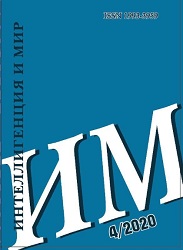Письма христианского интеллектуала: Алкуин и его эпистолярное наследие
Letters of the Christian intellectual: Alcuin and his epistolary heritage
Author(s): Anastasiya Andreyevna IlyinaSubject(s): Christian Theology and Religion, Cultural history, 6th to 12th Centuries, History of Religion
Published by: Ивановский государственный университет
Keywords: Alcuin; antique epistolography; Carolingian Renaissance; early medieval intellectuals;
Summary/Abstract: The article examines the epistolary legacy (numbering more than three hundred letters) of Alcuin of York, perhaps the most prominent figure of the so-called Carolingian Renaissance, a famous associate of Charlemagne. Comparison of Alcuin’s letters with samples of late antique epistolography makes it possible to trace the degree of continuity of cultural and social practices of pagan Antiquity and the Christian Middle Ages. In addition, reference to Alcuin’s correspondence makes it possible to look into the inner world of a Christian intellectual, to get acquainted with the issues and problems that occupy the minds of his contemporaries, to build a scheme of Alcuin’s network communication and to understand how far his spiritual influence extended in Europe and with which social layers he communicated. Setting the goal of identifying the characteristic features of the Christian intellectual community at the turn of the VIII—IX centuries on the basis of the analysis of Alcuin’s epistolary heritage, the author of the article defines the social and geographical boundaries of the circulation of Alcuin’s letters, identifies the succession of his letters from the ancient epistolary tradition, identifies and analyzes the main problems raised in Alcuin’s letters. To achieve this goal, the article uses a historical and anthropological approach with elements of semiotic analysis. The succession of Alcuin’s correspondence from the traditions of late antique epistolography is reflected, first of all, in the form of letters, the way they were written, and the use of stable rhetorical techniques. At the same time, attention is drawn to the change in the social portrait of the address and, due to this, the expansion of the circle of addressees, which now includes not only representatives of the highest secular and church elite, but also insufficiently educated and ignoble people, for whom Alcuin acted as a spiritual father and mentor. The analysis of the letters shows that Alcuin’s awareness of his responsibility for the fate of the addressees determines the subject matter of the letters, many of which are devoted to explaining the responsibilities of certain members of the Christian community, defining the area of responsibility of the laity and clergy, constructing of the image of an ideal clergyman or a righteous layman.
Journal: Интеллигенция и мир
- Issue Year: 2020
- Issue No: 4
- Page Range: 96-107
- Page Count: 12
- Language: Russian

